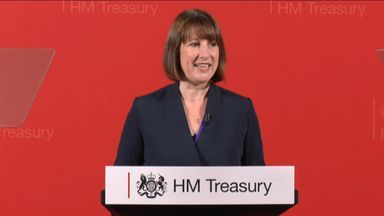
Does it make sense to secure a mortgage rate before the Budget?
Tags: Remortgages, Residential mortgages
When you’re shopping for a mortgage one of the key decisions is when to lock in a rate: now or wait. With the next Budget on November 26, it’s worth asking: could securing a rate before the Budget make sense? Following recent experiences (notably the Liz Truss episode), agreeing a mortgage soon does make sense.
Chancellor Rachel Reeves has strongly indicated that tax rises are coming and that 'each of us must do our bit' - during her recent press conference, part of the plan must have been to warn the money markets about what is going to happen. In part to avoid financial panic. Although stories in the press today suggest she may have made changes to her plans.
Why the Budget matters for mortgage borrowers
The UK Budget (or Fiscal Statement) often signals future economic policy: taxation, borrowing and spending. These announcements can affect market expectations around interest rates, inflation and therefore borrowing costs.
Lenders price mortgage deals not in isolation, but by reference to broader wholesale funding, swap rates, gilt yields, and the base rate set by the Bank of England. If the markets anticipate a big policy shift, mortgage rates can move ahead of the policy itself.
From the borrower’s viewpoint: if you wait for the Budget before locking in a rate, you might benefit if policy is favourable and market rates drop. But conversely you risk missing a “window” if market rates rise ahead of the announcement.
At Trinity Financial we often advise clients: locking in a rate gives you a level of certainty, particularly when the market is volatile or when a major fiscal event is coming up. If you’re moving or remortgaging soon, you might prefer certainty rather than speculation.
What happened during the Truss mini-Budget — a cautionary tale
It’s worth revisiting the September 2022 mini-Budget under Liz Truss & Chancellor Kwasi Kwarteng. While this was a unique event, its impact is instructive for how markets respond to fiscal shocks and how that translates into mortgage markets.
Key features of the mini-Budget
- On 23 September 2022, the UK government announced a package branded the “Growth Plan” (aka the “mini-Budget”), comprising significant tax cuts and spending commitments.
- Measures included: cutting the basic rate of income tax earlier than planned, abolishing the 45% additional rate for high earners, reversing the 1.25% National Insurance rise, cutting stamp duty — all to be funded by increased borrowing.
- The trouble: markets reacted badly. The pound fell sharply, gilt yields (UK government borrowing costs) spiked, and swap rates moved higher.
What happened to mortgage rates?
- Within weeks, lenders withdrew or re-priced many mortgage deals as wholesale funding costs spiked and swap rates got volatile.
- The average two- and five-year fixed mortgage rates rose significantly — for example, the average two-year fixed rate rose dramatically.
- Approval volumes fell, the market stalled, many borrowers who thought they could wait found the cost of borrowing had jumped significantly.
Key points:
- Even though the policy decisions were fiscal (taxes/spending), the mechanism through which mortgages were impacted was market funding cost and expectations.
- The key lesson: when major policy announcements are poorly flagged, or the market perceives elevated risk/turbulence, mortgage rates can rise quickly, sometimes ahead of the formal event.
- Thus, waiting for a “better deal after the Budget” is not always safe if markets are already anticipating adverse scenarios.
So — does it make sense to secure before the Budget now?
Given that backdrop, here’s how we at Trinity Financial would frame the decision. Of course, every client’s situation is different (deposit size, income, term, risk appetite), so the final call is personal — but these are the general factors:
Reasons to lock in before the Budget - or not
- If you’re moving or remortgaging in the next few months anyway: locking in now gives you protection against market spikes.
- If having certainty matters for your budget/cashflow: even a small % point difference in rate can add or subtract £100s per month in large mortgages, so the peace-of-mind of knowing your rate can be worth the premium.
- If you believe the Budget may include unfavourable measures (e.g., tax rises, regulatory changes) that could feed into higher rates or lender costs.
- If you suspect the Budget will bring positive changes that could ease borrowing costs (e.g., stamp duty cut, tax reliefs, incentives for first-time buyers) and you don’t mind taking the risk.
Aaron Strutt, product director at Trinity Financial, says: "Clearly not everyone is going to be able to get a mortgage over the next few weeks, but there are lots of borrowers who can. If you secure a rate now, then it normally takes a few weeks to get a mortgage offer produced. Mortgage offers are also valid for between three and six months, depending on the mortgage lender. If you get a rate, then it is typically possible to switch to cheaper rates with the lender, provided you are not too close to the completion date."
What to watch out for in the upcoming Budget
While we can’t predict exactly what the next Budget will bring, here are features that are especially relevant for prospective borrowers:
- Stamp duty / LBTT (Scotland) / Land Transaction Tax (Wales): any relief here can improve buyer affordability, possibly increasing demand and pressure on prices/rates.
- Incentives for first-time buyers or home-movers: e.g., tax reliefs or deposit schemes. That could shift demand and lender product pricing.
- Borrowing/spending plans: If the Budget signals high borrowing or continued high inflation, the markets may anticipate higher interest rates (or delay cuts) which could feed into mortgage pricing.
- Base rate outlook: While the Budget doesn’t set the base rate, any commentary around inflation, public finances, or monetary policy can influence expectations.
- Housing or consumer-credit regulation: If there are changes to how lenders assess affordability, deposit requirements, or regulation of buy-to-let, those may affect product availability.
Get expert mortgage advice from Trinity Financial
At Trinity Financial, our team of experienced London mortgage brokers specialises in helping borrowers secure the right deal. We work with all major lenders and can guide you through the full application process.
Call Trinity Financial on 020 7016 0790 to secure a first-time buyer mortgage or book a consultation
Your mortgage is secured on your property. Your property may be repossessed if you do not keep up repayments on your mortgage













